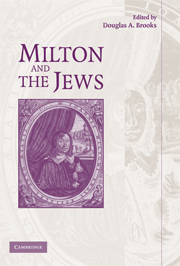Book contents
- Frontmatter
- Contents
- Acknowledgments
- Contributors
- 1 Introduction: Milton and the Jews: “A Project never so seasonable, and necessary, as now!”
- 2 England, Israel, and the Jews in Milton's Prose, 1649–1660
- 3 Milton's Peculiar Nation
- 4 Making Use of the Jews: Milton and Philo-Semitism
- 5 Milton and Solomonic Education
- 6 T. S. Eliot, Anti-Semitism, and the Milton Controversy
- 7 A Metaphorical Jew: The Carnal, the Literal, and the Miltonic
- 8 “The people of Asia and with them the Jews”: Israel, Asia, and England in Milton's Writings
- 9 Returning to Egypt: “The Jew,” “the Turk,” and the English Republic
- Select Bibliography
- Index
5 - Milton and Solomonic Education
Published online by Cambridge University Press: 02 July 2009
- Frontmatter
- Contents
- Acknowledgments
- Contributors
- 1 Introduction: Milton and the Jews: “A Project never so seasonable, and necessary, as now!”
- 2 England, Israel, and the Jews in Milton's Prose, 1649–1660
- 3 Milton's Peculiar Nation
- 4 Making Use of the Jews: Milton and Philo-Semitism
- 5 Milton and Solomonic Education
- 6 T. S. Eliot, Anti-Semitism, and the Milton Controversy
- 7 A Metaphorical Jew: The Carnal, the Literal, and the Miltonic
- 8 “The people of Asia and with them the Jews”: Israel, Asia, and England in Milton's Writings
- 9 Returning to Egypt: “The Jew,” “the Turk,” and the English Republic
- Select Bibliography
- Index
Summary
And God gave Solomon wisedome, and understanding, exceeding much, and largenesse of heart, even as the sand that is on the sea shoare.
And Solomons wisedome excelled the wisedome of all the children of the East countrey, and all the wisedome of Egypt.
For hee was wiser then all men; then Ethan the Ezrahite, and Heman, and Chalcol, and Darda the sonnes of Mahol: and his fame was in all nations round about.
– 1 Kings 4.29–31In recent years, scholars with intimate knowledge of Hebraic sources have greatly expanded our understanding of Milton's intellectual debts to non-Christian texts. In Milton's Epics and the Book of Psalms (1989), for example, Mary Ann Radzinowicz examines Milton's lifelong appreciation of Hebraic poetics, focusing on the poet's translations and appropriations of the Psalms. Rather than identify specific intellectual debts of a religious or legalistic nature, Radzinowicz considers instead how a stylistic appreciation of Hebrew Scripture shaped Milton's own prosody. In Torah and Law in Paradise Lost (1994), Jason Rosenblatt complicates the traditional understanding of the poet's Pauline hermeneutics, revealing that Milton's attitude toward Mosaic law was far less cynical and condemnatory than the views of other contemporary English Protestants. Rather than denigrate the Hebraic emphasis on obedience as established through covenant rather than grace, Milton uses the Old Testament's high regard for law – according to Rosenblatt – as a basis both for his scriptural justification of divorce and his empathetic depiction of prelapsarian Edenic happiness.
- Type
- Chapter
- Information
- Milton and the Jews , pp. 83 - 104Publisher: Cambridge University PressPrint publication year: 2008
- 1
- Cited by

